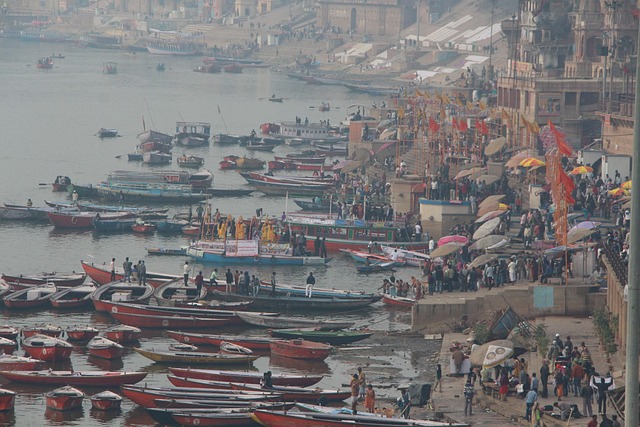A Quest for Balance Between Tradition and Progress in India’s Largest State
Lucknow – Uttar Pradesh, the land of the Ramayana, the Ganges, and the Bhakti and Sufi movements, has long been a beacon of philosophy, culture, and tradition. Yet, in the face of modernization, urbanization, and political polarization, the state grapples with the question: Are we staying true to our roots, or are we losing our way?
As societal structures evolve and challenges mount, Uttar Pradesh finds itself at a crossroads, striving to reconcile its ancient wisdom with the demands of a fast-paced, ever-changing world.
Key Metrics
- Urbanization: Uttar Pradesh’s urban population grew to 24% in 2021, up from 20% in 2001, indicating rapid urban expansion (Census Data).
- Poverty Rates: Despite progress, 29% of the population still lives below the poverty line, reflecting stark socio-economic inequalities (NITI Aayog SDG Index 2023).
- Environmental Pressures: The state recorded 15 of the 20 most polluted cities in India, with Kanpur and Ghaziabad consistently topping the list (IQAir Report 2023).
- Youth Demographics: Over 35% of Uttar Pradesh’s population is aged 15-35, making the challenges of education, employment, and engagement critical (Census 2011).
Philosophical Foundations of Uttar Pradesh
1. The Dharmic Perspective
Rooted in the Ramayana and Mahabharata, the philosophy of dharma emphasizes moral duty and societal harmony.
- Modern Relevance: As urbanization disrupts traditional family and community structures, the need for a collective sense of responsibility and ethical living grows stronger.
2. Bhakti and Sufi Traditions
The Bhakti and Sufi movements emphasized love, compassion, and equality, rejecting dogma and orthodoxy.
- Impact Today: These philosophies can inspire solutions to communal tensions and the marginalization of weaker sections of society.
3. Gandhian Principles of Swaraj
Mahatma Gandhi’s vision of self-reliance and decentralization resonates with the state’s Panchayati Raj system and grassroots governance.
- Current Application: Grassroots movements addressing rural issues, such as water conservation and organic farming, reflect Gandhian ideals.
Modern Challenges in Uttar Pradesh
1. Urbanization and Displacement
The rapid expansion of cities like Lucknow and Noida has led to the displacement of rural populations and the erosion of traditional livelihoods.
- Impact: The growing urban-rural divide exacerbates inequalities, with rural communities often excluded from the benefits of modernization.
2. Environmental Degradation
With rising air and water pollution levels, Uttar Pradesh faces an ecological crisis that threatens its natural and cultural heritage.
- Data Insight: The Ganga and Yamuna rivers remain heavily polluted despite government initiatives like Namami Gange, which has allocated over ₹20,000 crore for their rejuvenation.
3. Socio-Economic Inequality
While industrial hubs like Kanpur and Noida thrive, vast sections of the population in Bundelkhand and Purvanchal remain impoverished and underserved.
- Example: The state’s unemployment rate stands at 7.2%, with rural areas disproportionately affected (CMIE Report, 2023).
4. Political Polarization
Communal and caste-based divisions continue to impact social harmony, challenging the syncretic ethos of the state.
Philosophical Reflections on Modern Challenges
1. Reviving the Concept of Dharma
- Application: Policies and governance should prioritize collective welfare over individual gains, drawing from dharmic ideals of justice and equity.
2. Emphasizing Syncretism
- Inspiration: Bhakti and Sufi philosophies offer frameworks for promoting communal harmony through shared cultural celebrations and interfaith dialogues.
3. Gandhian Sustainability
- Actionable Steps: Encourage grassroots movements focused on sustainable practices, such as organic farming and decentralized energy solutions.
Initiatives Addressing These Challenges
- Namami Gange Program
- Aims to reduce pollution and restore the ecological health of the Ganga, though significant gaps in implementation persist.
- Skill Development Programs
- Initiatives like PMKVY have trained over 2 million youth, aiming to reduce unemployment and empower rural populations.
- Smart Cities Mission
- Urban centers like Lucknow and Kanpur are integrating citizen feedback into urban planning, though challenges of inclusivity remain.
- Swachh Bharat Abhiyan
- Community-driven cleanliness campaigns seek to instill a sense of responsibility and environmental consciousness.
A Path Forward
- Strengthening Grassroots Engagement
- Empower local governance bodies to address community-specific challenges, bridging the urban-rural divide.
- Promoting Education and Awareness
- Incorporate teachings from the Ramayana, Mahabharata, Bhakti, and Sufi traditions into curricula to foster ethical and inclusive worldviews.
- Environmental Responsibility
- Expand green initiatives and promote sustainable development practices to combat pollution and climate change.
- Encouraging Interfaith Collaboration
- Revive cultural programs that celebrate the syncretic heritage of Uttar Pradesh, fostering unity across communities.
Conclusion
Uttar Pradesh’s challenges reflect a microcosm of India’s broader struggles with modernity and tradition. While the state grapples with issues like urbanization, environmental degradation, and socio-economic inequality, its rich philosophical heritage offers timeless lessons.
By embracing its traditions of dharma, syncretism, and self-reliance, Uttar Pradesh can navigate these challenges, forging a path that balances progress with its cultural and spiritual roots. In doing so, the state can remain a guiding light for the nation, preserving its identity while shaping a sustainable future.


Leave a Reply